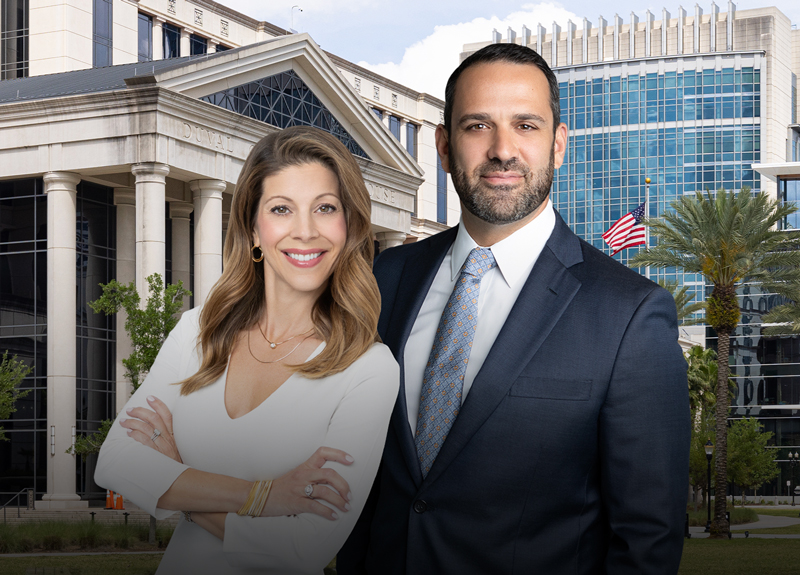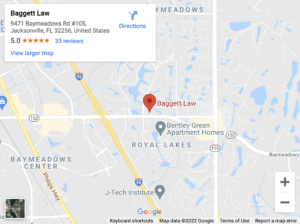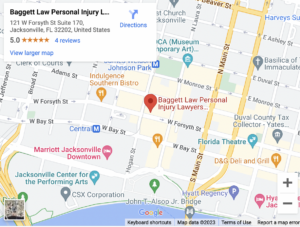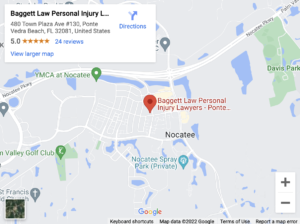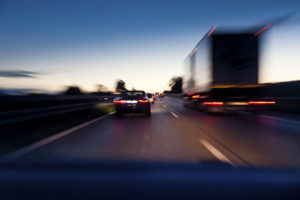
Your chest is susceptible to injuries during a car accident. The force of a collision can cause your body to whip around. Your seat belt and airbag will stop you by restraining your chest.
As a result, you could suffer severe injuries to your chest. Worse yet, these injuries could damage your spinal cord or vital organs.
Here is an overview of chest injuries you might suffer after a car accident in Jacksonville.
Anatomy of Your Chest

Your chest includes the region of your body between your head and your abdomen. Biologists refer to this part of your body as your thorax. Your chest usually refers to the musculoskeletal portion of your thorax, while the thoracic cavity describes the interior of your chest.
The most characteristic bones in your chest are your ribs. Your ribs form a cage to protect your thoracic cavity and the vital organs it contains.
Your heart and lungs sit inside your chest. Your chest also protects several major blood vessels, such as the pulmonary artery and pulmonary veins connecting your heart to your lungs. Your trachea and esophagus also pass through your thoracic cavity.
You have 12 pairs of ribs. The top seven ribs on each side connect to the sternum through cartilage. The next three ribs on each side connect to the seventh rib through cartilage. The bottom two ribs on each side do not connect to the sternum or other ribs.
In your back, all 24 ribs connect to your vertebrae. Ligaments hold the ribs to the vertebrae to form 24 joints. Ligaments also connect the vertebrae to each other. These ligaments hold your skeleton together and provide flexibility in these joints so you can twist and bend your body at your chest.
Your clavicles sit at the top of your chest in the front of your body. The scapulas sit behind your shoulders in the back of your chest.
Several large muscle groups are in your chest. Muscles sit between your ribs. Large muscles in your back anchor to your spine, skull, and scapulas. In your front, muscles anchor to your sternum, ribs, clavicles, and arms.
How Do Car Accidents Cause Chest Injuries?
During a car accident, your body experiences powerful forces that can injure your chest. These forces include blunt forces and whipping forces.
Blunt Forces
Blunt forces strike your chest without piercing your skin. Hitting the seat belt or airbag can cause a blunt force injury.
Blunt forces can bruise soft tissue. Chest bruises happen when your tissue gets squeezed, causing blood vessels to burst.
Blunt forces can also fracture bones. An impact with the seat belt can fracture a rib by causing it to bend and crack.
Whipping Forces
Even if your chest does not hit anything, it can still suffer an injury from the whipping forces you experience during a collision. When your car collides with something, your body wants to keep moving at the same speed as before the collision.
Different parts of your body come to a stop at different times. Your legs and hips slide forward until they hit the lap belt and stop. But your chest, neck, and head keep moving forward. Even if you do not hit the seat belt with your chest, your torso will whip forward, hyperextending your chest.
If you get hit from the side, your chest will experience a similar whipping force. But in a side collision, your body will bend sideways and twist from the combination of forward and sideward motion.
The hyperextension your chest experiences from this whipping motion can tear muscles, tendons, ligaments, and cartilage. It can even fracture bones if the tension in the ligaments and tendons overcomes the strength of the bone.
What Are Some Examples of Chest Injuries?
Some examples of chest injuries that result from car accidents include chest strain or sprain, torn cartilage, and fractured rib.
Chest Strain or Sprain
Chest strains happen when you stretch or tear the muscles in your chest. Strains also happen when you damage the tendons that anchor those muscles to your chest bones.
Symptoms of a chest strain include:
- Pain
- Swelling
- Stiffness
- Weakness
- Muscle spasms
Chest sprains happen when you stretch or tear the ligaments in your chest. Some signs of a chest sprain include:
- Pain
- Swelling
- Stiffness
- Bruising
- Popping sensation at the time of injury
Strains and sprains usually heal on their own in four to six weeks with rest and ice. You can also take over-the-counter anti-inflammatory drugs to manage the pain and swelling. Doctors rarely operate to repair a chest strain or sprain.
Torn Cartilage
The same forces that can stretch or tear muscles can also tear cartilage. Cartilage is a smooth flexible tissue that sits in your joints. It cushions the joints and prevents bones from grinding against each other as they move.
Your ribs connect to your sternum with cartilage. You also have cartilage where your ribs meet your vertebrae.
A car accident can tear the cartilage in your chest. This usually happens when a force on your sternum or ribs causes them to hyperextend the joints and stretch the cartilage.
Symptoms of torn cartilage include:
- Pain, particularly when breathing
- Swelling
- Clicking or popping in your chest
Cartilage can heal without medical treatment. But cartilage heals more slowly than other soft tissues. You might experience symptoms from torn cartilage for months after your car accident.
Fractured Rib
A fractured rib can happen when the force of a car accident causes a rib to crack. It can also happen when the impact of your ribs on a hard surface, like your door, console, or dashboard, shatters the bone.
A fractured rib often heals on its own in six to eight weeks. If the rib shatters into three or more pieces, you may experience flail chest. This condition may cause death without emergency treatment.
How Do I Recover Compensation for a Chest Injury After a Car Accident?
You can seek injury compensation if your car accident resulted from another driver’s negligence. To prove negligence, you and your injury lawyer must show that the other driver did something objectively unreasonable, such as driving distracted or failing to yield at an intersection.
A chest injury can cause symptoms ranging from discomfort to death. Even minor chest injuries can cause pain that lasts for months.
Therefore, you may be entitled to compensation for your economic damages (financial losses like medical bills and lost income) and non-economic damages (losses due to pain and suffering).
Contact a Jacksonville Car Accident Lawyer for Help With Your Claim
You may be entitled to file a claim or lawsuit after suffering chest injuries in a car accident in Jacksonville. Contact Baggett Law Personal Injury Lawyers for a free consultation to discuss your claim. Our car accident attorneys in Jacksonville, FL will help your explore your legal rights to compensation after the accident.

